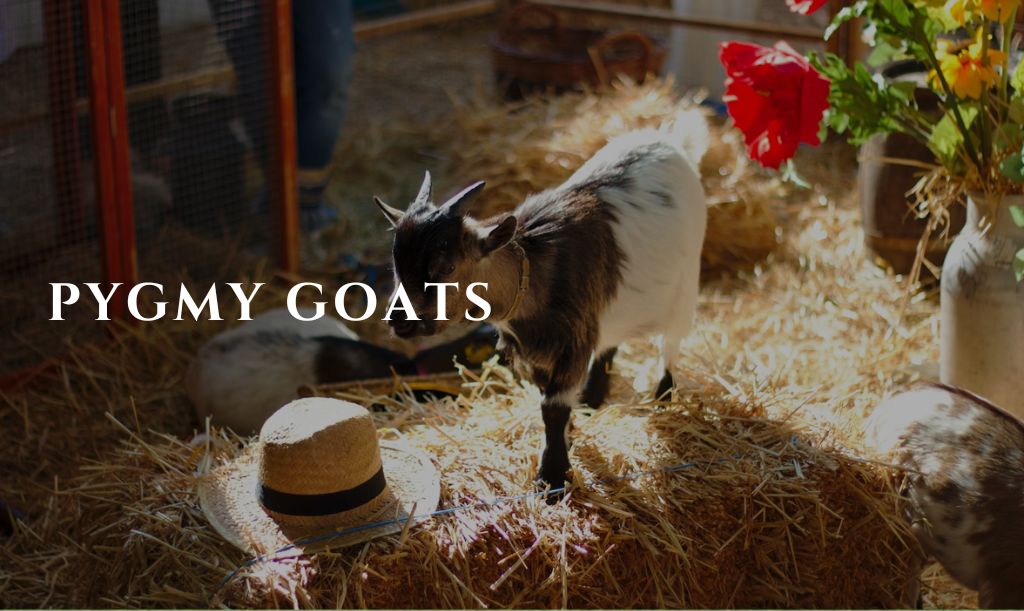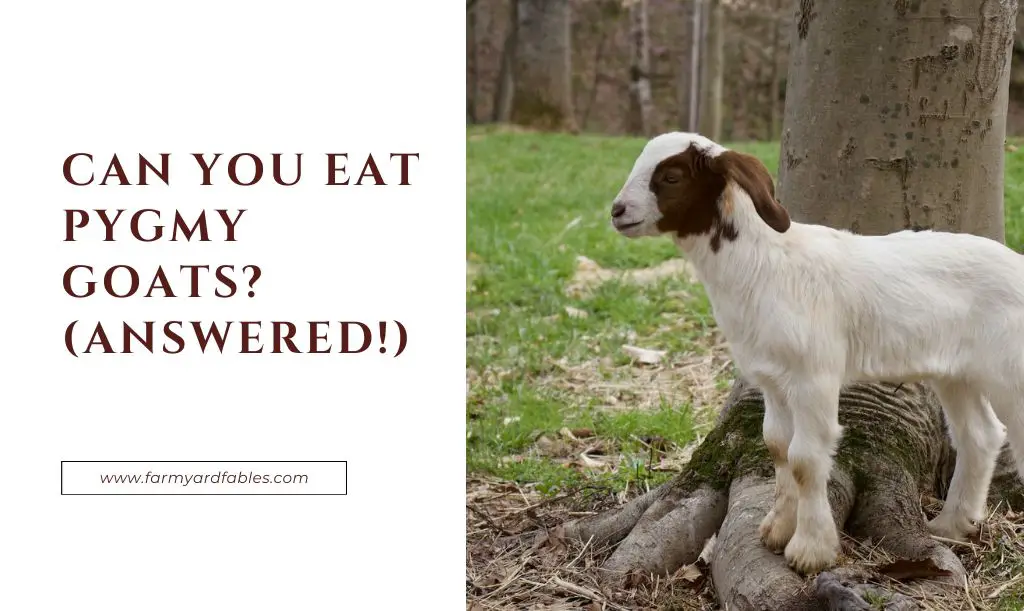Can you eat pygmy goats?
This is a controversial question if there ever was one.
Pygmy goats have become popular pets in recent years with their miniature stature and playful antics.
But let’s face it!
Most people keep pigs for consumption not as pets.
In fact, Pygmy goats were initially bred for meat and pigs before they were introduced to Europe and North America.
So that brings us back to the question: Can we eat pygmy goats?
Yes, you can eat pygmy goats, but it’s not a common habit in many communities. Pygmy goats are primarily kept as pets or for their milk, not for meat production. They are small in size and not typically raised for meat due to their limited meat yield.
Now, before we dive further into this contentious debate, let me clarify one thing: I am not advocating for the mass slaughter and feasting upon innocent pygmy goats.
However, as an advocate for open-mindedness and informed decision-making, I believe it is important to explore all aspects of this topic.
In truth, there is no law or moral code that explicitly forbids consuming pygmy goat meat.
While they may be treasured as pets by many, we must not forget that these creatures are fundamentally still domesticated livestock.
Throughout history and across cultures, humans have selectively bred animals for various purposes – from companionship to sustenance.
With that said, let’s proceed!
Can You Eat Pygmy Goats (Key Takeaways)
- Pygmy goats are not typically raised for meat production.
- They are primarily kept as pets or for their milk.
- Pygmy goats are small in size, resulting in limited meat yield.
- If you’re interested in goat meat, consider larger goat breeds bred specifically for meat.
- Check local regulations and cultural practices regarding goat consumption in your area before considering it as an option.
Origins and History Of Pygmy Goats

Pygmy goats have a rich and storied history that traces back to the vast landscapes of West Africa.
These miniature marvels were first domesticated by humans for their meat, milk, and hides.
Yes, our ancestors recognized their practical value long before pygmy goats became merely objects of adoration.
The journey of these pint-sized wonders took a turn when they embarked on an unexpected adventure across oceans to foreign lands.
In the late 19th century, European explorers stumbled upon these captivating creatures during their colonial exploits in Africa.
Mesmerized by their diminutive size and lively disposition, they couldn’t resist bringing them back home as exotic novelties.
Their Introduction To Europe and North America
As soon as Pygmy goats set hoof on European soil, these charming creatures began captivating hearts with their playful antics and irresistible charm.
Their popularity quickly spread like wildfire across continents as people marveled at their compact size and adorable features.
Soon enough, farmers in Europe realized the potential of pygmy goats as pets or companion animals rather than mere sources of sustenance.
And so began an era where these miniature marvels graced suburban gardens and country estates with their presence.
The introduction of pygmy goats to North America followed suit but with even more fervor.
From urban dwellings to sprawling farms, pygmy goats won over hearts with ease.
Their arrival breathed fresh air into the world of animal husbandry, charming both young and old alike.
Pygmy goats had transcended their humble origins and become global sensations.
Their journey from West Africa to Europe and North America is a testament to the indomitable spirit of these endearing creatures.
Watch this:
Cultural Perspectives on Consuming Goat Meat
To fully comprehend the potential of pygmy goat meat as an unconventional choice, we must acknowledge its significant presence in diverse culinary traditions.
Goat meat has been celebrated and embraced in many parts of the world for its tender texture and distinct taste.
From Mediterranean delights to Caribbean flavors, various cuisines have elevated goat meat to the status of a beloved staple.
In Greece, succulent roasted goat is a delicacy that graces festive tables, offering an explosion of savory flavors that transport diners to sun-kissed islands.
Similarly, Turkish cuisine boasts hearty stews and kebabs made with tender cuts of goat that captivate with their rich aromas and complexity.
And let’s not forget the bold Jamaican jerk goat curry—a fiery dish that pays homage to Caribbean roots while showcasing the remarkable versatility of this protein.
The Ethical Dilemma: Should We Eat Pygmy Goats?
Eating pygmy goats?
The mere thought of such a notion strikes at the core of our moral compass, challenging our values and beliefs.
Pygmy goats, with their charming personalities and endearing appearance, have become beloved pets and cherished members of many households.
To consider them as a potential food source seems unthinkable to those who view them as loyal companions rather than delicacies on a plate.
Cultural differences play a significant role in how we perceive pet ownership.
In Western societies, pets are often seen as part of the family, receiving love, care, and even designated spots on the couch.
Their unconditional loyalty tugs at our heartstrings and ingrains an unspoken pact that they will never be treated as mere sustenance.
However, it is essential to recognize that different views exist in rural communities where animals serve various purposes beyond companionship.
These communities have long relied on livestock for sustenance and economic sustainability.
While some might argue that pygmy goats make lovable companions, others might view them primarily as livestock—creatures with utilitarian value in providing milk or meat for consumption.
Eating Pygmy Goats: Legal Considerations & Health Aspects
The legal landscape surrounding the consumption of pygmy goats is as convoluted as a politician’s speech.
In some jurisdictions, there are no specific laws that prohibit eating pygmy goats, while in others, the act can be met with severe legal consequences.
The lack of clarity on this matter highlights the absurdity of our legal system, where personal choice and individual rights are often stifled by archaic regulations.
Furthermore, even if consuming pygmy goats is not explicitly illegal in a particular jurisdiction, one must consider the potential ethical implications.
While legality and morality do not always align, it is crucial to respect the boundaries set by society’s collective conscience.
Eating a creature that has become synonymous with companionship and joy for many seems inherently wrong, doesn’t it?
The Health Hazards
From a health perspective, the consumption of pygmy goat meat poses several concerns.
Firstly, considering their diminutive stature and relatively low body weight compared to traditional livestock breeds bred for meat production, pygmy goats may not yield enough meat to satisfy nutritional needs without extensive breeding and farming efforts.
Additionally, there is limited scientific research on the safety and potential health risks associated specifically with eating pygmy goat meat.
It is essential to prioritize food safety and avoid potentially contaminated or mishandled meats that could lead to foodborne illnesses.
Therefore, until comprehensive studies are conducted to determine any potential adverse effects on human health from consuming pygmy goat meat, it would be prudent to err on the side of caution and explore other culinary options.
Watch this:
Can You Eat Pygmy Goats? Conclusion
The idea of eating pygmy goats raises numerous ethical, legal, and health concerns.
While it may be tempting to push the boundaries of gastronomic exploration, it is important to approach such endeavors with sensitivity and thoughtfulness.
Our choices should not only reflect our personal desires but also consider the impact they have on those around us.
Instead of indulging in questionable culinary adventures that might leave many feeling uneasy, let us focus on fostering a harmonious relationship with animals that brings joy and companionship rather than culinary consumption.
By appreciating these charming creatures for their innate qualities and promoting ethical treatment in all aspects of our lives, we can build a world that celebrates compassion and empathy.
Related Articles:
- https://farmyardfables.com/how-to-keep-pygmy-goats-out-of-chicken-coop/
- https://farmyardfables.com/can-pygmy-goats-be-house-trained/
FAQs
What Is a Pygmy goat’s meat yield?
Pygmy goats have a relatively low meat yield due to their small size. They are not typically raised for meat production because larger goat breeds are more suitable for meat purposes.
Are pygmy goats good for milk?
While Pygmy goats can produce milk, they are not known for high milk production like some other dairy goat breeds. People usually keep Pygmy goats more for their friendly and playful nature as pets rather than for milk.
Can Pygmy goats be used for meat?
While it is technically possible to use Pygmy goats for meat, they are not a popular choice for this purpose due to their small size and limited meat yield. Other goat breeds are preferred for meat production.
What is a pygmy goat good for?
Pygmy goats are primarily kept as pets due to their small size, friendly personalities, and playful nature. They are also sometimes used for educational purposes and in petting zoos.
How big do pygmy goats get?
Pygmy goats are small in size and typically stand between 16 to 23 inches tall at the shoulder. Their weight generally ranges from 40 to 75 pounds, with males being slightly larger than females.
- Do Goats Sound Like Humans? Find Out Here! - 22 December 2023
- Vegetable Oil For Constipated Goat (Comprehensive Guide) - 22 December 2023
- Is Bermuda Hay Good For Goats? (Solved!) - 21 December 2023


